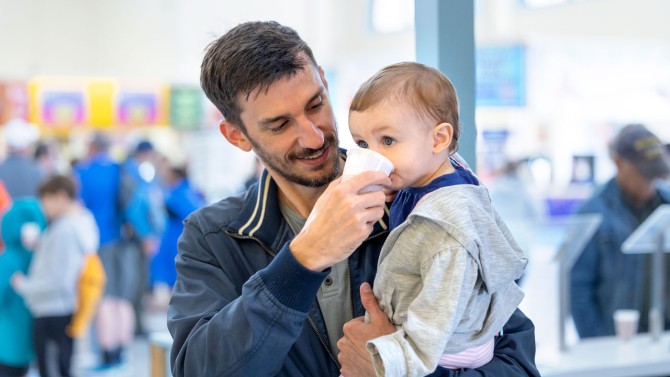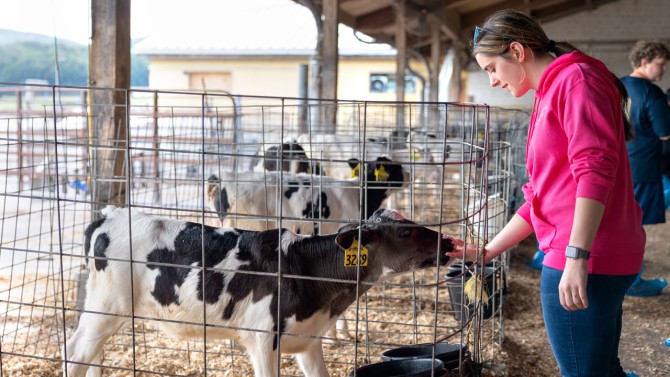The New York State Milk Bar has been serving up refreshing cups of milk for just 25 cents since 1983, and this cherished tradition continues today. Staffed by around 40 teenagers selected and trained by the Cornell Cooperative Extension Cayuga County, the Milk Bar provides a unique learning experience.
An udder throwback: Milk Bar at State Fair still pours milk for a quarter
By Laura Reiley, Cornell Chronicle
“I remember when a cup of milk at the fair cost a quarter.”
Folks stood in line at the New York State Fair in the big Dairy Building and when they shuffled to the front, they handed over a shiny quarter, maybe two dimes and a nickel, and got an ice-cold cup of milk in exchange. It was this way in 1983, the year “Risky Business” came out and Michael Jackson’s “Billie Jean” dominated the airwaves.
And it is precisely what it costs in 2024. Well, customers buy tokens worth 25 cents and then hand them over to the teens behind the counter. There’s a steady plink of tokens in aluminum buckets along the eight milk stations in the cavernous building, teens toggling between the spigots that dispense white milk and those that dispense chocolate.
The students, many as young as 14, applied and were hired by Cornell Cooperative Extension and trained over several days as part of a 4-H youth development workforce program, touring dairies to learn about the milk industry, visiting the Cornell Dairy Research Center and Cornell AgriTech in Geneva, New York, to dive into the challenges and technologies harvested to ensure a safe milk supply. The New York State Milk Bar has become an opportunity for workforce development through a partnership between New York State Department of Agriculture and Markets and Cornell Cooperative Extension.
For many it is a first job, a first paycheck, the first exposure to the bewildering idea that the customer is always right.
The teens explain that strawberry milk is only offered the last couple days of the fair (not enough spigots, so chocolate gets swapped out). They must gently decline to fill gallon jugs for thirsty customers while graciously filling sippy cups for toddler patrons.
The Milk Bar used to be owned by a for-profit business called NYS Dairy Exhibits, but they pulled out in 2017, after 60 years, because they said they were losing money.
“The State Fair called us with a request to help run the milk bar. We wanted to show up as good partners and took this on,” said Victoria Giarratano, assistant director of agriculture, food systems and community development at CCE. “So, I called Dan Welch, because he’s in the state’s largest dairy county.”
Daniel Welch, executive director of CCE Cayuga County, put out a call on social media. The first year they were scrambling to get applicants, last year they had just enough and this year they had 90 applicants for 40 slots.
“We added a little more education this year — more dairy education, more about food safety and hygiene, about general employability,” Welch said as he trailed a group of about a dozen students as they toured the Cornell Dairy Research Center.
The students learned about rotary and parallel milking parlors, about how each cow has a specific ID, so the dairy knows precisely how much milk she is producing each day. They learned that whole milk is 3.25% fat while low fat is 2%. They heard about the AI system that monitors the parlor to detect cows and how employees are milking, and they saw the experimental respiration chamber that measures cows’ methane exhalation.
“Do you have any questions?” repeatedly asked Samantha Schon, the farm manager at Cornell Dairy Research Center. A hand went up: “Do you have any calves?”
Even the coolest among the students couldn’t feign indifference in the long row of calf pens, many of the baby cows eager to nuzzle and lick the newcomers.
A week later, those same kids stood behind the Dairy Bar counter at 10 a.m., wearing rubber gloves and CCE visors. Outside “The Star-Spangled Banner” played, opening-day fairgoers stood at attention, and after the “home of the brave” rang out, hundreds of folks made their way inside.
Michael Jackson and his granddaughter, Madison, both from East Syracuse, were among the first customers, starting their day at the fair with cups of chocolate milk.
“Perfect, as always,” Michael Jackson said, swiping the back of his hand across upper lip.
Little kids carried their milk carefully across the shiny expanse of floor as if cups contained fissile material. Some drank fast: “Chug it! It’s ice cold!” Others, slow: “I want to savor the flavor.” In all, the teens poured nearly 30,000 cups of milk that first day.
“We’re building tomorrow’s workforce,” Giarratano said of the program. “We try to turn it into workforce development, with training tours and soft-skills training. We teach them how to fill out a timecard and we bring in a bank to teach them how to budget. Many of them don’t have bank accounts to deposit their checks in, so we help them with that.”
As the first day of the fair gets close to lunch time, there’s a bit of a lull in the milk bar traffic. The teens restock cups and wipe down the sinks.
For Julian Richardson of New York City, this is a first job.
“I’ve cleaned cars before, but this will be the first real paycheck,” he said.
What will he do with the money?
“I might save up, but I’m not sure.”
At a nearby station, Naiya Bhattacharjee, of Jamesville, New York, was more certain.
“My mom is trying to get me to be more responsible with money,” she said. “A lot of it is going into savings.”
Media Contact
Get Cornell news delivered right to your inbox.
Subscribe




